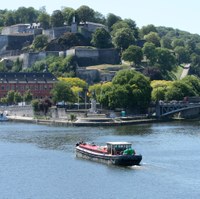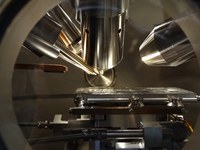The University of Namur
 In the Heart of Europe
In the Heart of Europe
The University campus is situated in the centre of the city of Namur, the capital of Wallonia (the French speaking region in Belgium), which is close to other major centres like Brussels. Students have direct access to the railway station, housing, shops, cinemas, theatres, sports facilities …
The UNamur campus has a lot to offer : a sports hall, a radio station , a choir , community housing for students sharing the same cultural or social project (« kots à projets »)… Various activities are organised on the campus such as sports competitions, tournamentsand challenges, introduction to music or plastic arts, language courses, theatre shows or concerts. Life is lived to the full in Namur.
 Studies and Success
Studies and Success
With 40 different programmes at the Bachelor, Master and Doctorate levels, the UNamur welcomes over 4,900 students in six Faculties: Arts, Law, Economics, Social Sciences and Business Administration, Computer Science, Medicine and Sciences. Its reputation is based on the quality of its education, the availability of its professors and sufficient resources to ensure maximum chances of success for each student: introduction to study techniques, preparation courses, small group work, course materials available on-line, personalized assessments…
The UNamur has redesigned its study programmes in line with the European harmonization of Higher Education (“Bologna Process”). The UNamur has widened the choice of its studies to reconcile both specificity and openness to social and human issues. Quality of study in Namur is a first class advantage for those who wish to discover a university on a human scale at the crossroads of Europe, as part of a study exchange programme or to prepare to enter professional life.
 Research: Reconciling Ethics and Excellence
Research: Reconciling Ethics and Excellence
Research in Namur aims at balancing ethics and excellence. At the University of Namur, 11 transdisciplinary research institutes excel in 5 main clusters: life sciences; material sciences; environmental questions; patrimonies and cultures; society and digital transition. The 9 technology platforms offer their expertise and state-of-the-art equipment to researchers and the industry. Together with the 6 faculties, professors and researchers work on multidisciplinary research projects with teams established worldwide. The UNamur excels in sectors such as nanotechnology, biotechnology, physics and chemistry of surfaces, engineering of information systems and data bases, legal questions raised by information and communication technologies, regional economics, economics of development and social representation of disabilities …
The results of research within the UNamur have led to the deposit of numerous patents, technology transfers to industry and the creation of 22 spin-off companies, 17 of which are in activity.
Every year, the University of Namur hosts researchers from the 5 continents in respect and in the framework of the EURAXESS programme. Foreign researchers constitute 22% of the research staff and benefit from the UNamur HRS4R strategy plan i.e. a welcome office for foreign researchers, a special support for legal document procedure and accommodations, a continuous training in transversal skills, recruitment policies in compliance with the euopean Charter and Code for researchers, access to a child-care centre reconciling family and professional life…
A University Open to the World
Fully integrated in the city and region, the UNamur participates actively in their social and economic development. It promotes partnerships with the local economic partners, develops evening and weekend education programmes and life-long learning … It offers consultancy services and expertise to the public and private sectors. These activities extend well beyond the region or national borders through the ongoing collaboration with international bodies.
The UNamur aims to promote justice and grants special concern to those who are socially or economically fragile. To mention but a few research projects: the DFLS (Basic Rights and Social Cohesion Research Centre), and the CRED (Centre for Research in the Economics of Development), or studies on the issue of disabilities conducted by the Department of Psychology. The University also promotes education for development through its NGO, the FUCID (University Foundation for International Development Cooperation).
The UNamur has found many ways to enlarge its network of contacts and to ensure international recognition: high quality teaching and research, coherent policies facilitating the exchange of students, researchers and professors as well as the hosting of international students, membership in numerous international associations, participation in development projects …
Our brand awareness brochure is available here...














